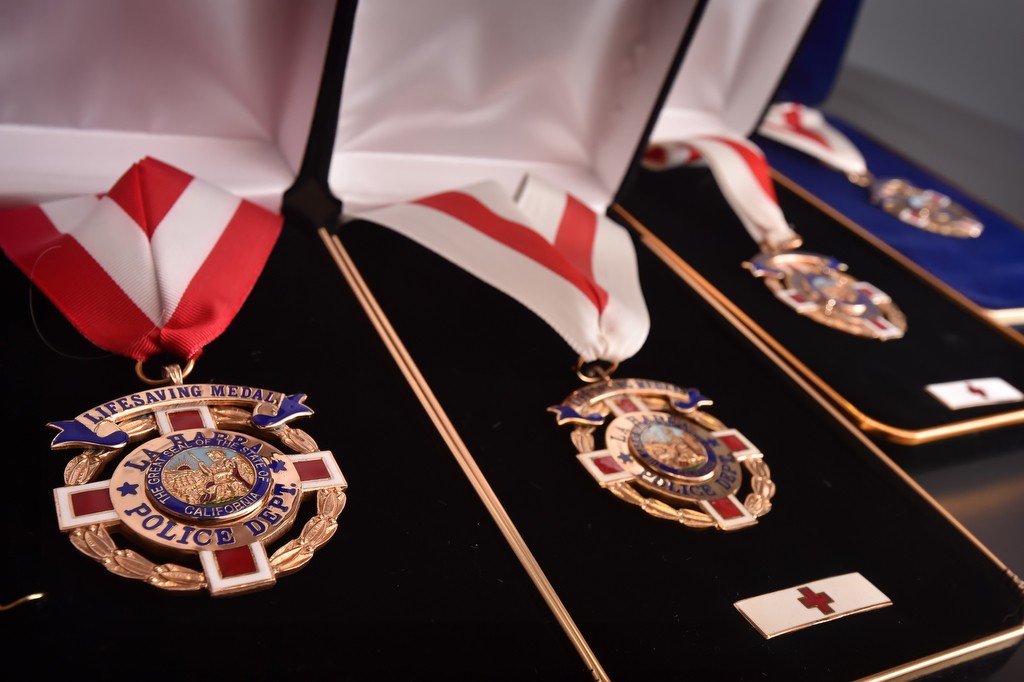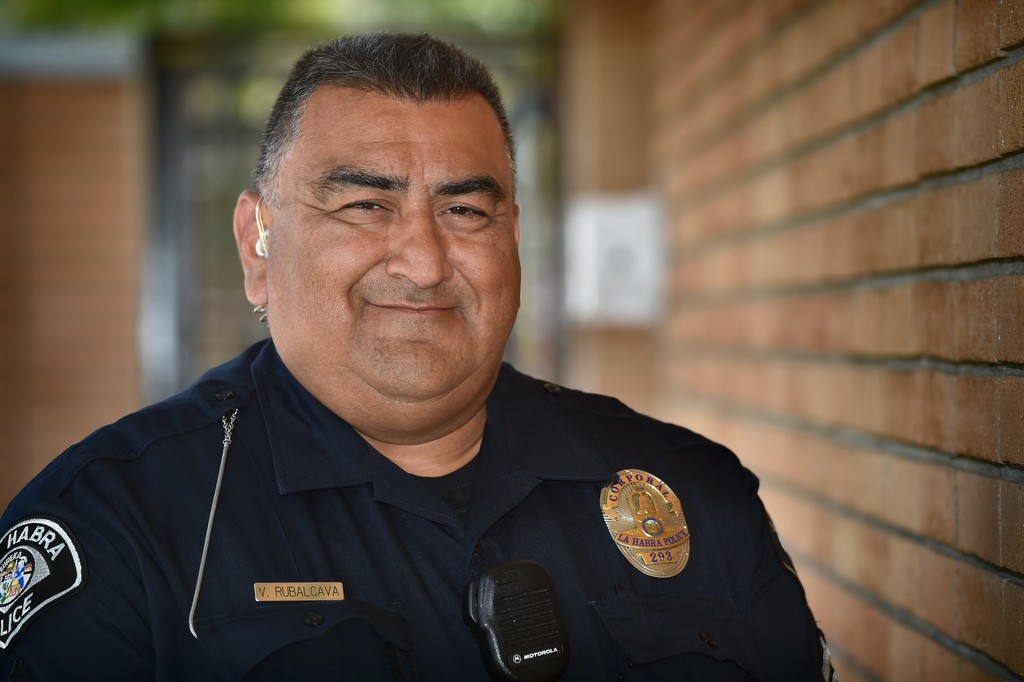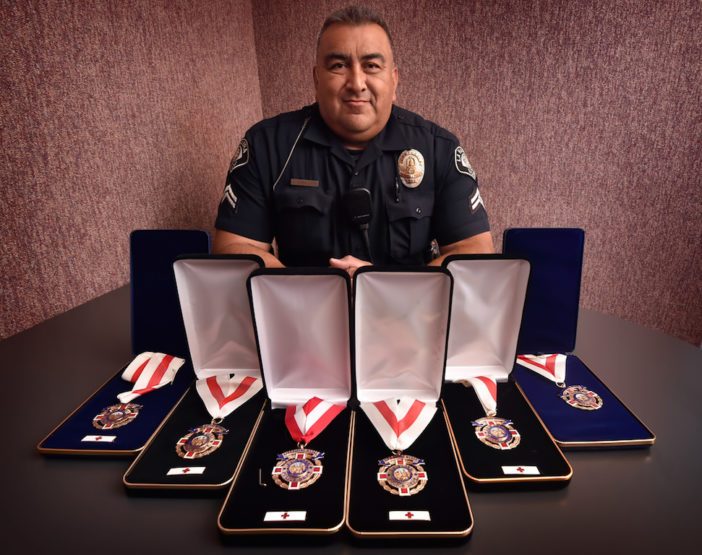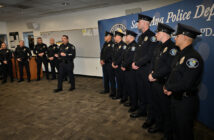Right place, right time seems too simple an explanation, but La Habra Cpl. Victor Rubalcava insists it’s the only one.
In his 21-year career with the La Habra PD, he has been honored with the lifesaving medal six times — the most in department history.
He most recently was recognized in June at the LHPD’s annual awards ceremony for his role in saving a man who crashed his bicycle after suffering a heart attack.
Rubalcava doesn’t keep track of his awards, quickly pointing out that every year he received the gold medallion hanging from the red and white ribbon, he was standing next to at least one of his colleagues.
Lifesaving is a team effort, he said.
“There are a lot of people here who have saved lives,” he said. “This is a great place to work full of great people who really care about their community.”
It took some pressing for him to recount the number of lifesaving awards he has received and the circumstances around them, along with when, exactly, he was named officer of the year — an honor he has received twice.
“We’re not here for awards or accolades,” he said. “We just have a job to do.”
Rubalcava, one of nine children, worked in his family’s iron business from a very young age before becoming a cop more than 20 years ago.
He served with Santa Ana PD for more than a year before transferring to La Habra PD in 1995.
With La Habra, Rubalcava worked the gang unit for six years and also served a year on the North County Tri Agency Resource/Gang Enforcement Team (TARGET).
He was then assigned to the the Meth Lab Task Force in 2006 before being promoted to corporal and heading back to patrol.
A year later, he got his first save.
Rubalcava, in July 2007, received the lifesaving medal after performing the Heimlich on a man choking on a piece of meat at a restaurant in the 2600 block of La Habra Boulevard.
“The guy was 6’2”, 260 and all muscle,” he said. “I remember I didn’t know if I was making any progress.”

Four of the six lifesaving medals that Cpl. Victor Rubalcava of the La Habra PD has earned.
Photo by Steven Georges/Behind the Badge OC
But Rubalcava kept working on him. The meat moved just enough to get the man some air, but it was still lodged in his throat.
The officer kept going until paramedics arrived and just as the man was getting loaded in the ambulance, Rubalcava said he heard a pop, and the meat came flying out.
The man sat up and rejoined his family at dinner.
“He just hopped off the gurney and said, ‘I’m good’ and sat back down,” the corporal said.
Then came one of the calls Rubalcava will never forget — a child not breathing.
When he and his partner arrived the night of April 30, 2010, they found a toddler lying on the floor, his panicked parents hovering above him.
Family members said the toddler had a fever that spiked, and then the nearly 2-year-old child stopped breathing.
“I remember he started to go blue on us,” Rubalcava said. “We just kept working on him and we were able to bring him back.”
The toddler had suffered a febrile seizure and was taken to a local hospital where he was treated.
“Afterwards, I would stop by from time to time to check on that little boy, and there he’d be bouncing off the walls,” Rubalcava said.
The family has since moved away, but the corporal said he’ll always remember the impact that he and his colleagues had on that child and his parents.
Just six months later, Rubalcava found himself at another scene in which his lifesaving skills were tested.
This time, it was a man who was found slumped over his bed and not breathing, but the quick response by La Habra PD helped revive the man.
In May 2012, Rubalcava also was one of five officers who helped pull a man from a U-Haul truck after the man suffered a heart attack and crashed the large truck into a house.
The officers performed CPR until paramedics arrived.

Cpl. Victor Rubalcava of the La Habra PD who has earned, among other awards, six lifesaving medals over the years.
Photo by Steven Georges/Behind the Badge OC
Then five years later, in February 2015, Rubalcava helped save another man who suffered a heart attack.
This one stays vivid in his mind.
Rubalcava remembers the wife was panicked and scared. She told officers her husband simply collapsed and had been down for about five minutes.
The time that had passed worried Rubalcava, but he and officers Phil Principe and Travis Nelson got to work.
Using an automated defibrillator, the team of officers was able to get the man’s heart beating again.
“I remember the man’s wife came to the awards ceremony and said the doctor told her that had we not been there and gotten to work immediately, her husband wouldn’t be here today,” Rubalcava said. “That really got me.”
When confronted with a life-and-death scenario, the corporal said he doesn’t get nervous or anxious.
“We get trained constantly,” he said. “We just do what we need to do. It’s like second nature. But it feels good when you save a life — when you get to prolong the time that person has with their family.”
But there are the times, when responding to these types of calls, that they don’t turn out as Rubalcava hopes.
“It doesn’t always work,” he said. “And that’s tough. You get there, hoping to revive somebody but, ultimately, all the work in the world can’t save someone. Only God can do that. When that happens, I just believe in my faith and go from there.”
In Rubalcava’s career there are more happy endings than not, and he said he most hangs on to seeing how his work, and that of his partners, helps those he serves.
 Behind the Badge
Behind the Badge



